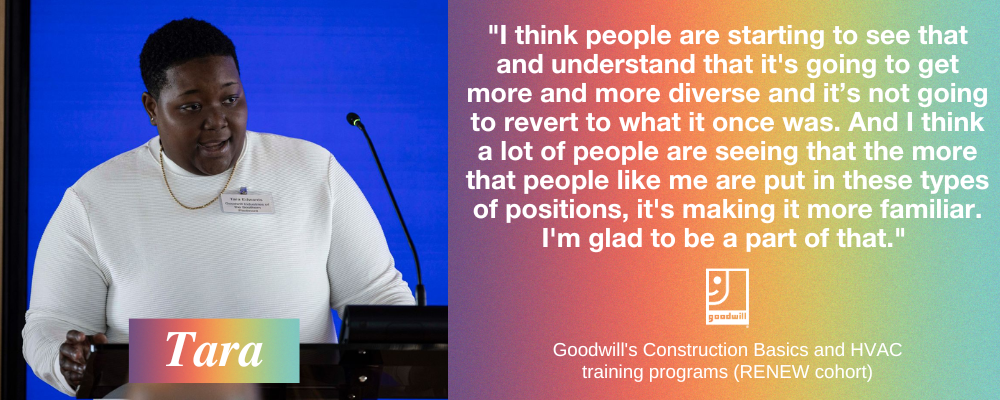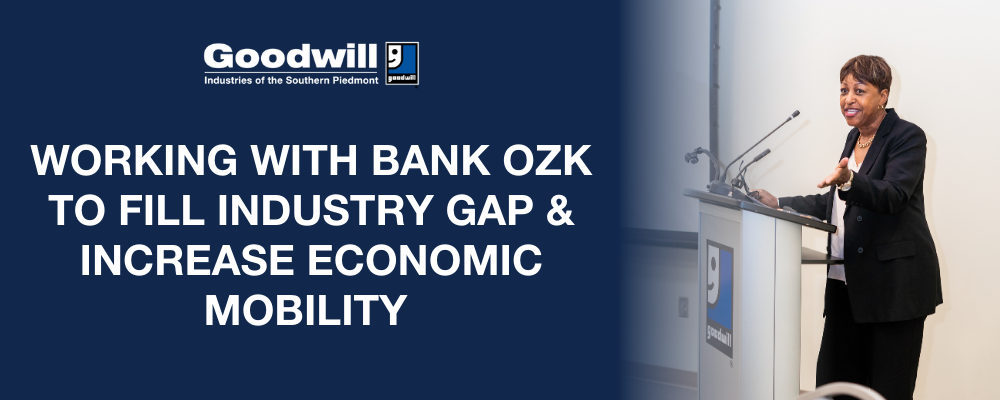Pride Month is an important time of recognizing and promoting dignity, acceptance and visibility for members of the LGBTQIA+ community. It’s a time to celebrate the accomplishments and resiliency of the LGBTQIA+ community, and a time to commemorate years of struggle for equal rights and the ongoing pursuit of equity.
One of our shared purpose statements here at Goodwill Industries of the Southern Piedmont is that “everyone and everything matters.” And we believe that to our core. We’re committed to serving others with excellence regardless of their background, circumstance, the color of their skin, sexual orientation, gender expression or however they identify.
It is our hope that our community partners and employers who hire our talented participants uphold the same values.
Tara Edwards, a member of the LGBTQIA+ community and graduate of the first female cohort of the Renewable Energy and Efficiency Workforce (RENEW) training program delivered at the Goodwill Construction Skills Training Center, is paving the way for herself and others. Now working as a Superintendent I for MetCon, she shares how she is partnering with her employer to create an equitable workspace for all and what other employers can do to be more inclusive.
When looking for work, were you ever concerned about identifying as a gay woman?
“In this industry I definitely was. Knowing the dynamics of construction as a male-dominated industry, I was worried about all three: I was worried about being black, I was worried about being a female and I was worried about being gay. Being black and being gay is not as hard as being a woman in this industry. Getting respect as a woman is harder than anything else because you’re just looked at like you can’t handle certain situations or you can’t handle certain conversations.”
How has your current company provided inclusivity to you?
Allyship in the workplace – “The group of guys that I work with, we’ve developed a relationship to where they don’t like certain things to be said to me. Since I’ve been in this position, there’ve been some hiccups. They have a tendency to set the tone and say [on my behalf] certain things just aren’t going to be tolerated. They came up in the industry that I’m walking into and have made me aware; if anything is said, they correct it immediately.”
Inclusion of spouse – “Prior to us getting married, she was always invited to any company events, and they were very welcoming. Every year we have a Christmas party and most of us bring our significant others. She came to the first two and the most recent one she didn’t attend but almost everybody asked about her. You have a lot of situations where people don’t take LGBTQIA+ couples seriously. We’re not looked at as important as a heterosexual couple, but I get that respect. Just like everybody else does when it comes to her being my family.”
Change of benefits – “Paternity leave is about three weeks [with my company] and maternity leave is about three months. So, my situation is like, where do I fall into that? So, we worked it out to where I got a month and a half, somewhere in between. People in the LGBTQIA+ community want families. You have to adjust certain things that might not be major, but they matter.”
What can employers do to be inclusive?
“I think just the understanding of basic common sense. We’re regular people, we just have a different preference. Just because I do fall under certain categories doesn’t change anything about my morals. It doesn’t change anything about my work ethic. For example, I had a conversation with my boss about maternity leave, because I won’t be technically carrying the child, but I didn’t know how that time off would work for me. It’s little things like that, that hadn’t been talked about or changed, but that was something that they were open to adjusting for my situation.”
What do you see for the future of inclusivity in the construction industry?
“I think people are starting to see that and understand that it’s going to get more and more diverse and it’s not going to revert to what it once was. And I think a lot of people are seeing that the more that people like me are put in these types of positions, it’s making it more familiar. I’m glad to be a part of that.”








Join the Conversation